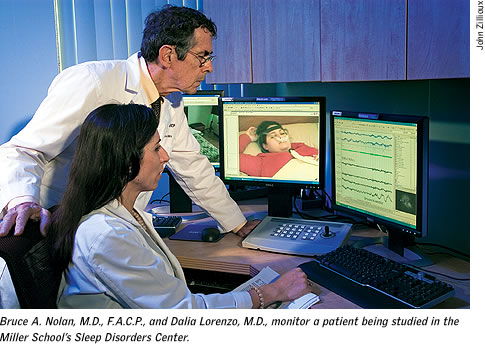
If you’ve ever felt like you could nod off at your
desk during the day, think about this. You may not just
be sleepy—you may be dangerously ill.
“Sleep apnea is known to make high
blood pressure worse. It’s known to make cardiac
arrhythmias worse,” says
Dalia Lorenzo, M.D., assistant professor of neurology
in the Miller School of Medicine’s Sleep Disorders
Center.
Apnea is a breathing-related sleep disorder,
characterized by snoring or difficulty breathing, often
resulting in
somebody being jarred out of their sleep gasping for
breath. Physicians have known for years that apnea can
disrupt
sleep, leaving people exhausted. But only recently have
they found a direct link between apnea and hypertension.
“Probably the greatest difficulty is just under-recognition
of the problems, and I would say that’s particularly
true in relation to high blood pressure and individuals
who are overweight,” says Bruce A. Nolan, M.D., F.A.C.P.,
director of the Sleep Disorders Center. And the American
population is—literally—growing. The National
Institutes of Health reports that two-thirds of Americans
are overweight or obese. More obesity means more sleep
apnea, especially in men who tend to gather more weight
in their upper bodies and necks.
To meet the growing demand, the Sleep
Disorders Center has expanded. A new four-bed facility
features all new
equipment and furniture in the National Parkinson’s
Foundation Building to complement a similar four-bed facility
at the Miami Veterans Affairs Medical Center. Both facilities
can diagnose apnea, restless leg syndrome, and other sleep
disorders. The mission now is to educate people,
both in the general populace and in the health care community. “Maybe
one in 20 men in the general population will have significant
sleep apnea,” Nolan says. “The number for women
is about one in 40.”
The good news is that sleep apnea can
be easily fixed without surgery or medication.
But many people turn to sleeping pills
for sleep apnea, which can be dangerous. “When the body doesn’t
receive enough oxygen in the brain and heart and kidneys,
your body sends you a little rush of adrenalin so that
you’ll wake up and breathe,” explains Lorenzo. “But
if you give yourself a sleeping pill you make it difficult
for the brain to wake you.”
Breathing may stay obstructed or slowed.
Patients in that situation aren’t only sleep deprived, they’re
oxygen deprived.
“Breathing lower levels of oxygen
is kind of like running your vehicle on low-octane fuel,” says
Nolan. “You
can do it, and you may not notice any real noticeable
change in the short run. But over the longer period of
time the
internal system just doesn’t work as well.”
That’s why Nolan wants primary care physicians to
make the connection between weight, hypertension, and apnea.
It’s as simple as asking overweight patients whether
they’re sleepy during the day and whether they snore.
“There are people who do sleep normally,” says
Nolan, with a laugh.
The newly expanded UM Sleep Disorders
Center is for everyone else. |